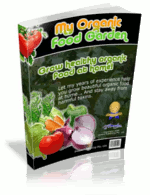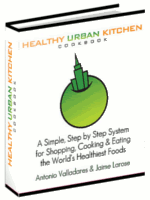Although having an organic garden sounds a little hard, it is not. Maybe you picture your house like a horticulture experiment, but you just need a little space and take things easy.
If you are a newbie, don’t worry. You just need to get some space in your garden and prepare a couple of plants. Although you can use the seed from fruit you buy in the supermarket, you will go better with certified seeds. They are inexpensive and you can buy them almost anywhere; just check they are not expired.
Getting your soil prepared to host your plants is not a big deal. All you have to do is include some organic fertilizer and make it a little spongy, using additional substrates like perlite or peat moss. I use a mix of both, half perlite, half peat moss. The peat moss gives it great water retention and perlite gives it more “body”.
Now the hard part… you must dig out some soil and mix it with your mixture. Remove all rocks and debris, but leave roots, plants and anything else you take out. Those things will be part of the organic mixture in your soil, making it more attractive to beneficial bacteria that will make it more fertile.
If you can put some earthworms, it will be great, although is not exactly a must. Earthworms will keep your soil healthy, let air and water flow and make your beneficial bacteria thrive.
With this, you will be ready to go. All you have to do is put in some seeds, water and let the sun and the soil do their magic. Since you will be nearby to take care of them, they should grow fine. You can reuse your grass clippings, as in the image, to protect your plants from excessive sun and to make the soil retain more water.
As you can see, having your organic garden is really easy. There are no special things involved and you don’t have to be an expert. What you need is action. Unlike other “assisted” techniques, organic gardens take their time and you can’t rush nature.
So, get into your shorts this weekend and make the hard work in the early morning, unless you like blazing sun in your back.
Friday, May 15, 2009
Start Your Own Organic Garden
Saturday, May 9, 2009
Where To Start
Maybe you have considered having a little organic farm in your house. Although is easy to fantasize about that, to jump from the dreaming mode to the working mode is another story. Many people I know do not start just because they don’t have a clear idea of what to do. Having your own organic products is not that hard, but there seem to be many things that have to be done.
So, if you are really considering to grow your own organic products, is relatively easy and you don’t need too much money, specially if you are going to take de DIY path. To start, just consider the next pointers:
Start checking out the space. Take a walk around your house. Imagine where you can have some plants. It doesn’t matter if you live in a 100 acre home or a city apartment; you can still have your own organic products with a little imagination. Nowadays there a lot of options for materials, seeds, tools and organic fertilizers to choose from, so it is likely that you will be able to squeeze anything you want, even if your house seems to be too crowded.
Make your list of materials. Although this has not been a concern from several years now, it is worth mentioning. When you choose what organic products you will produce and what techniques you will use, find out where to buy everything so you don’t run out of material. As I already said, this will be hardly a concern, since you can buy organic products, materials and tools almost everywhere, even online. Nevertheless, is something to think about, specially is you do things yourself.
Choose your plants. Since you can grow almost anything, choosing what to grow can be difficult. To make things simple, remember that you have a space limitation, so choose those plants that are the most expensive or rare. If you plan your organic little farm, you can have vegetables every season, and, with a greenhouse, year round. But forget that for the moment; first, choose your plants. Tomatoes are very popular because they grow fast, are delicious and versatile, and the plants can give you fruits all year if you provide them with what they need. California peppers is another good option, but it is up to you… After all, I don’t know your cooking.
With your imagination, the possibilities are endless. I take it that you like doing things yourself, so you can make a good design, like big plants outside and little spices on the windows. You can even use artificial lights to grow things indoors.
So, take a tour in your house and imagine getting your organic produce. In a while you will have a lot of ideas to consider and several organic materials and tools to get everything going.
Thursday, May 7, 2009
What is the "Organic" buzz?
For more than a decade, organic food or produce has been the alternative for a healthy diet. Lets face it: we humans are constantly growing our numbers and we all need to eat. This has put a great strain on production systems, so crops receive a little “help” to get higher yields. Although most of the things used in the crops you take home are relatively “safe”, they do have traces of fertilizer, pesticides and other things that can affect your health.
Will you drop dead? Not likely… however, there is a chance that you will have certain complications in the long run. The solution? Get organic stuff! But, what is it? Well, strictly speaking, anything that is alive is organic, no matter how much pesticide, steroid or genetic engineering is involved. However, there is an international standard that defines “organic” produce.
This means that you can go to the organic section and buy an absolutely healthy, non tampered with produce. Yea, right. The standard defines certain chemicals that can be used on that particular produce, so there is a certain window of opportunity for companies.
So, how you can fix this? The solution is growing things by yourself. Yes, there is a little work involved and you will lose some of the space in your house, but also you will have control over your plants and you will save a few bucks.
Companies have exaggerated the advantages of organic produce and the dangers of the traditional one, making organic produce to have a much higher price tag in the supermarket. If you can have a couple of plants in your house, specially the expensive ones, you will be saving a substantial amount every year, not to mention that is a good exercise.
In these times of magic formulas for agriculture, pollution and global warming, having a little organic garden will give you a little advantage over everybody else and you will learn a lot of useful things. You just need a little space and imagination.




